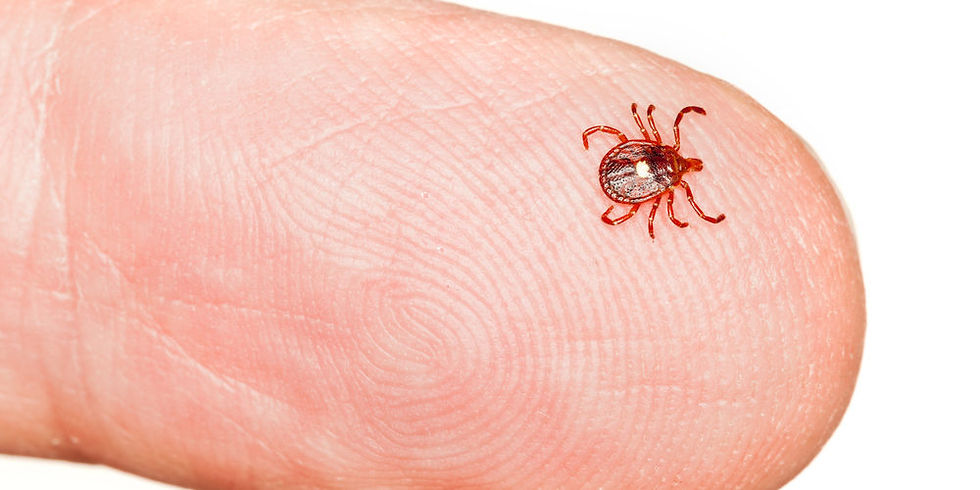Tick saliva drug could ease chronic pain and itching in people
[Mar 10, 2022: Ibrahim Alrashdi, Durham University]

A protein found in tick saliva could be turned into a drug that eases itching and chronic pain in people. (CREDIT: Creative Commons)
A protein found in tick saliva could be turned into a drug that eases itching and chronic pain in people.
New research has shown that the protein – called Votucalis – provided pain and itch relief in research involving mice.
The findings from Durham and Newcastle Universities, in collaboration with pharmaceutical company Akari Therapeutics Plc, could lead to a replacement for traditional painkillers, for example opioids, that can be ineffective, can have serious side-effects and can be addictive.
The research is published in the journal Frontiers in Pharmacology.
Votucalis is derived from the saliva of ticks – in this case the brown-ear tick Rhipicephalus appendiculatus – who secrete the protein into their host when feeding so the host is unaware that they have been bitten.
Votucalis is a biologic drug that works by binding histamine, produced in the body, with high-affinity and thereby prevents histamine activating its four cell surface receptors resulting in reduced itch or chronic pain responses.
Related Stories
Conditions that cause chronic pain or itching include atopic dermatitis, psoriasis, arthritis, diabetes, sciatica, back injuries.
Study co-author Dr Paul Chazot, in the Department of Biosciences, Durham University, UK, said: “Persistent or chronic pain is a huge global health challenge, which affects over 20 per cent of the population."
“It is the single biggest reason that people in the UK visit their doctor and it is recognised as a priority disease by the World Health Organisation."
"The National Institute for Health and Care Excellence (NICE) has recommended that current opioid and gabapentinoid pain medications should not be prescribed to patients newly diagnosed with chronic pain, apart from cancer sufferers, so there is an urgent need to develop a new, long-lasting medication that is both effective and safe to use."
“Our study is the first to show evidence of the anti-itch and pain relief potential of Votucalis, which is very exciting. We could be on the brink of discovering a viable alternative to opioid and gabapentinoid drugs.”
Unlike opioids – which are morphine-based – the research shows that Votucalis does not enter the brain, which means it is not addictive and less likely to cause side-effects. It can be manufactured in large amounts using recombinant methods.
Study co-author Dr Ilona Obara, began the research with Dr Chazot while at Durham and continued the work after moving to the School of Pharmacy, Newcastle University, UK.
Dr Obara said: “It is amazing that a protein found in the saliva of this tiny creature could prevent chronic pain and itching in people."
“These are conditions that bring a huge amount of misery, and current medication displays limited efficacy, and can also often be detrimental to patients."
“Votucalis has already been tested in humans with other conditions, including conjunctivitis, without major side-effects, so the potential for this to be developed into a drug to tackle chronic pain and itching is definitely there.”
The researchers say the next step towards clinical testing is to develop a delivery system to effectively administer the drug at the site of itch and pain.
Votucalis is a pipeline drug for Akari Therapeutics Plc (UK), and Drs Chazot and Obara are co-authors on its patent for neuropathic and inflammatory pain.
Mr Clive Richardson, Chief Executive Officer of Akari Therapeutics Plc (UK), said: “We are delighted to be working with Drs Chazot and Obara on the pipeline drug Votucalis. The exciting new data in pain and itch supports the potential that the unique mode of action of Votucalis, inhibiting all four histamine receptors, opens exciting therapeutic opportunities in pain management and dermatology.”
The research has been funded by a PhD scholarship from the Saudi Arabian government, and partially funded by Akari Therapeutics Plc and the Medical Research Council Confidence in Concept scheme.
For more science news stories check out our New Discoveries section at The Brighter Side of News.
Note: Materials provided above by Durham University. Content may be edited for style and length.
Like these kind of feel good stories? Get the Brighter Side of News' newsletter.
Tags: #Global_Good_News, #New_Discoveries, #Medical_Good_News, #Pain, #Saliva, #Drugs, #Ticks, #Proteins, #Science, #Research, #The_Brighter_Side_of_News







Comentarios